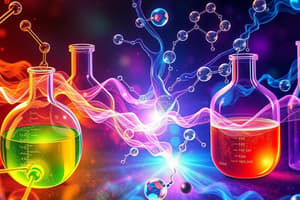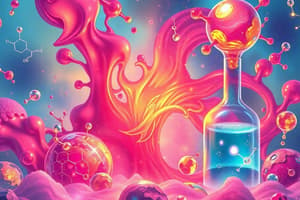Podcast
Questions and Answers
What is secularism and how is it reflected in governance?
What is secularism and how is it reflected in governance?
- Ensuring that government remains neutral in religious matters. (correct)
- Restricting the practice of all religions in public spaces.
- Promoting a single religion in government policies.
- Integrating religious beliefs into the political framework.
Which of the following describes the impact of liberalization on India?
Which of the following describes the impact of liberalization on India?
- Increased government control over the economy.
- Reduction of tariffs and increased foreign investment. (correct)
- Stagnation of economic growth and exports.
- Complete elimination of public enterprises.
What are the advantages of the public sector?
What are the advantages of the public sector?
- Complete privatization of resources.
- Higher profit margins due to lack of competition.
- Provision of essential services and stability in the economy. (correct)
- Focus solely on wealth generation.
Which of the following factors does NOT affect the location of industries?
Which of the following factors does NOT affect the location of industries?
What is sustainable development primarily concerned with?
What is sustainable development primarily concerned with?
What is pollination primarily concerned with?
What is pollination primarily concerned with?
What do Mendel’s laws of inheritance explain?
What do Mendel’s laws of inheritance explain?
What is the main importance of variation in species?
What is the main importance of variation in species?
Which of the following best describes refraction?
Which of the following best describes refraction?
What is a significant outcome of the Dandi March?
What is a significant outcome of the Dandi March?
What role do banks play in the Indian economy?
What role do banks play in the Indian economy?
How do political parties influence public opinion?
How do political parties influence public opinion?
What are agro-based industries primarily concerned with?
What are agro-based industries primarily concerned with?
What is corrosion and how can it be prevented?
What is corrosion and how can it be prevented?
Which of the following describes a redox reaction?
Which of the following describes a redox reaction?
What is the significance of the pH scale in everyday life?
What is the significance of the pH scale in everyday life?
What are alloys and give an example?
What are alloys and give an example?
Which statement about the modern periodic law is true?
Which statement about the modern periodic law is true?
What is a key difference between saturated and unsaturated hydrocarbons?
What is a key difference between saturated and unsaturated hydrocarbons?
What is transpiration in plants, and why is it significant?
What is transpiration in plants, and why is it significant?
What is the primary function of hormones in the body?
What is the primary function of hormones in the body?
Flashcards
What is secularism?
What is secularism?
A form of government where the state does not discriminate on the basis of religion and all religions are treated equally.
What is the role of local government?
What is the role of local government?
Local governments, like municipalities and panchayats, play a key role in providing basic services, managing local resources, and representing local needs. They empower citizens through participatory governance.
How do political parties function in a democracy?
How do political parties function in a democracy?
Political parties are essential for democracy. They offer a platform for different ideologies and beliefs, contest elections, form governments, and hold the government accountable.
How are economic activities classified by employment?
How are economic activities classified by employment?
Signup and view all the flashcards
What is sustainable development and why is it important?
What is sustainable development and why is it important?
Signup and view all the flashcards
What is a chemical reaction?
What is a chemical reaction?
Signup and view all the flashcards
What is a balanced chemical equation?
What is a balanced chemical equation?
Signup and view all the flashcards
What is the pH Scale?
What is the pH Scale?
Signup and view all the flashcards
What happens when an acid reacts with a base?
What happens when an acid reacts with a base?
Signup and view all the flashcards
What are the properties of metals and non-metals?
What are the properties of metals and non-metals?
Signup and view all the flashcards
Why do ionic compounds have high melting and boiling points?
Why do ionic compounds have high melting and boiling points?
Signup and view all the flashcards
What is transpiration?
What is transpiration?
Signup and view all the flashcards
What are hormones and what do they do?
What are hormones and what do they do?
Signup and view all the flashcards
What is pollination?
What is pollination?
Signup and view all the flashcards
What are the types of pollination?
What are the types of pollination?
Signup and view all the flashcards
What is the role of DNA in inheritance?
What is the role of DNA in inheritance?
Signup and view all the flashcards
What is reproductive health?
What is reproductive health?
Signup and view all the flashcards
What are Mendel's laws of inheritance?
What are Mendel's laws of inheritance?
Signup and view all the flashcards
Why are variations important?
Why are variations important?
Signup and view all the flashcards
What is the process of natural selection?
What is the process of natural selection?
Signup and view all the flashcards
How is sex determined in human beings?
How is sex determined in human beings?
Signup and view all the flashcards
Study Notes
Chemical Reactions and Equations
- Define a chemical reaction: A chemical reaction is a process where one or more substances (reactants) change into one or more different substances (products).
- Example of a chemical reaction: Iron + Water → Iron Oxide + Hydrogen
- Balancing chemical equations: Fe + H₂O → Fe₃O₄ + H₂ (Requires balancing)
- Types of chemical reactions: Different reactions with examples (needs more detail for valid examples)
- Redox reaction: A reaction involving both oxidation and reduction (Example needed)
- Corrosion: The deterioration of metals due to chemical reactions (Two prevention methods are needed)
Acids, Bases, and Salts
- pH scale: A scale used to measure the acidity or basicity of a solution. Its significance is to indicate the degree of acidity or alkalinity of a substance or solution which is useful in many disciplines.
- Acid-base reaction: Reaction between an acid and a base (Example needed, like acid and metal)
- Baking soda production (chemical reaction needed)
- Bleaching powder preparation and uses (needed)
- Acid-metal reaction (Example needed)
Metals and Non-Metals
- Physical properties of metals and non-metals: Compare (needs more details for comparison)
- High melting/boiling points of ionic compounds: Ionic compounds have strong electrostatic forces between ions.
- Electrolytic refining of copper (needs details)
- Reactivity series of metals: Order of metals based on their reactivity
- Alloys: Mixtures of two or more metals (two example with uses needed)
Carbon and its Compounds
- Covalent bonding in carbon compounds: Carbon forms covalent bonds with other elements.
- Homologous series: A series of compounds with similar structures but differing in the number of repeating units (an example is needed)
- Cleansing action of soaps and detergents: Chemical process (needs more details)
- Saturated and unsaturated hydrocarbons: Saturated (single bonds) unsaturated (double or triple bonds).
- Ethanol: Properties and uses of ethanol (needed)
Periodic Classification of Elements
- Mendeleev's periodic law: Elements are arranged in order of increasing atomic weight, and elements with similar properties appear at regular intervals
- Modern periodic law: Elements are arranged in order of increasing atomic number and elements with similar properties appear at regular intervals
- Atomic radius: Distance from the center of the nucleus to the outermost electron
- Electronegativity: Ability of an atom in a chemical compound to attract shared electrons.
- Classification of elements into groups and periods (needs more explanation)
Life Processes
- Autotrophic and heterotrophic nutrition (examples needed)
- Human respiration (details needed)
Control and Coordination
- Human brain structure: Describe
- Reflex action (with example, describing how it starts and reaction is essential)
- Hormones: Description of function and source. Function and source of each for a valid example
- Neuron structure and function (needed)
- Plant responses to light (plant hormones) (needed)
How Do Organisms Reproduce?
- Asexual reproduction in amoeba: Method of reproduction with stages
- Human reproductive system: Structure and Function (needs details for a description)
- Pollination: Explanation needed with types required (pollination types).
- Role of DNA in inheritance (details needed)
- Reproductive health and its importance (details needed)
Heredity and Evolution
- Mendel's laws of inheritance: Explanation and examples necessary
- Importance of variations (details needed)
- Natural selection: Explain concept in detail
- Sex determination in humans: Explanation
- Acquired and inherited traits
Light - Reflection and Refraction
- Laws of reflection: Explanation about laws
- Refraction through a prism: Explanation
- Functioning of the human eye: explanation
- Convex lens image formation: Explanation
- Defects of vision and their correction (details are needed)
50 Important Questions for CBSE X Science -Additional Topics - History (from page 2)
- Causes and consequences of French Revolution
- Unification of Germany: Process
- Gandhiji in Indian National Movement: Role of Gandhi
- Causes of Non-Cooperation Movement
- Print culture impact on Indian nationalism (important details required)
50 Important Questions for CBSE X Science -Additional Topics - Geography (from page 3)
- Types of resources: Examples of resources are needed
- Soil erosion and control methods: Details of control methods are essential
- Importance of water conservation: Importance needed
- Agro-based industries: Examples are required
- Location and importance of Iron and Steel in India: More details and location of factories
50 Important Questions for CBSE X Science -Additional Topics - Geography (from page 3 cont.)
- Power sharing: Explanation of concept with examples in India.
- Federalism in India: Features and more details.
- Challenges of political parties in India: Details, description or definition
- Outcomes of Democracy: Explanation and details
- How political parties influence public opinion: Details required
50 Important Questions for CBSE X Science -Additional Topics - Economics (from page 3 and 4)
- Definition of development and measurement
- Primary, secondary, and tertiary sectors: Needs more description than just the names
- Role of banks in Indian economy: Details needed
- Globalization impact on Indian economy: Detailed explanation required
- Importance of Organized and unorganized sectors in India (details are needed)
50 Important Questions for CBSE X Science -Additional Topics - History (from page 4)
- Impact of Civil Disobedience Movement: Details needed
- Significance of Dandi March: Details needed
- Causes and consequences of 1857 Revolt: Details needed
- Non-cooperation versus Civil disobedience movement: Difference in aims (details needed)
50 Important Questions for CBSE X Science -Additional Topics - Geography (from page 4)
- Importance of forests and wildlife resources: Importance is essential
- Distribution of water resources in India: More detail like location and quantity
- Cropping patterns and major crops: Explanation with details
- Methods of Irrigation (required)
- Minerals: Classify them and examples are required
- Secularism implementation: Details of secularism and how it is implemented
- Role of local government in India: Role and significance is essential
- Democracy, economic inequality, and the role of citizens
Studying That Suits You
Use AI to generate personalized quizzes and flashcards to suit your learning preferences.
Related Documents
Description
Test your knowledge on chemical reactions, equations, and the roles of acids, bases, and salts. This quiz includes definitions, examples, and types of reactions, along with the pH scale and key concepts like corrosion and redox reactions. Challenge yourself to balance equations and understand various chemical processes.




